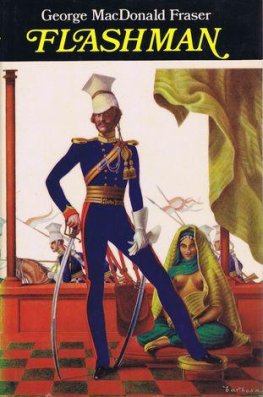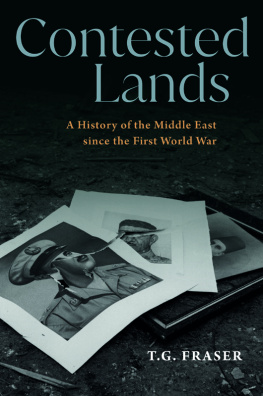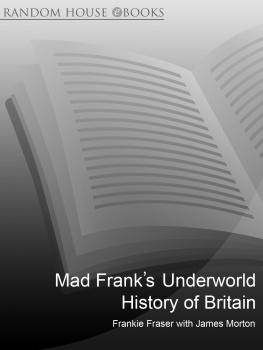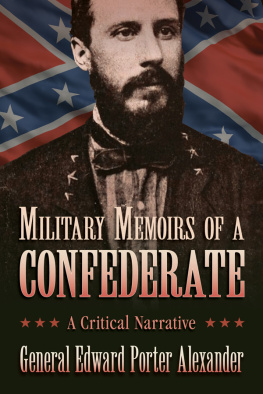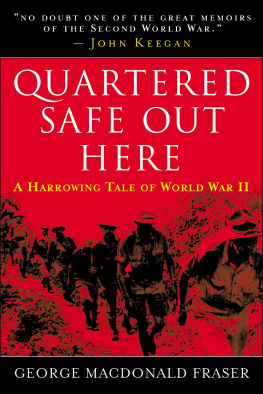Wars and Shadows
Memoirs of
General Sir David Fraser

This electronic edition published in 2011 by Bloomsbury Reader
Bloomsbury Reader is a division of Bloomsbury Publishing Plc, 50 Bedford Square, London
WC1B 3DP
Copyright David Fraser, 2002
The moral right of author has been asserted
All rights reserved
You may not copy, distribute, transmit, reproduce or otherwise make available this publication
(or any part of it) in any form, or by any means (including without limitation electronic, digital,
optical, mechanical, photocopying, printing, recording or otherwise), without the prior written
permission of the publisher. Any person who does any unauthorised act in relation to this
publication may be liable to criminal prosecution and civil claims for damages
ISBN: 9781448207718
eISBN: 9781448207718
Visit www.bloomsburyreader.com to find out more about our authors and their books
You will find extracts, author interviews, author events and you can sign up for
newsletters to be the first to hear about our latest releases and special offers
Contents
My memory of the remote past, of scenes and personalities from my childhood and youth, is very clear, and in this book I have recalled some of the people and places making particular impressions on me when young. In so doing I have attempted to recall not only figures but moods now far distant. This memoir begins soon after the end of the First World War (I was born in 1920) and I have commented on language, times and characters, sometimes with reflections prompted by hindsight or more extended study. I have tried to be faithful to the personal feelings I remember to have experienced, and where time has modified these to say so.
Then comes the Second World War, with impressions both more vivid and more recent and episodic. My later chapters, inevitably, reflect a more even flow. There was plenty of variety in my life in the years between the end of war and my retirement but the vicissitudes of a professional career are more predictable, and the recollection of them less intense. Each professional interlude has its challenges, its ups and downs, but the pace and movement of a career like mine was latterly less feverish than when under the pressures of youth or war.
Throughout, the figures who people my landscape differ widely: no serious historian is likely to find much matter here. A few were famous in their twentieth-century day, whether in war, on the London stage or in public life. Many, on the other hand, were without distinction in the worlds eyes but connected to me by affection, merry, light-hearted, often dying young. Inevitably some, of differing ages, were members of my own family whom I have thought it good gently to recollect, delineate, memorialize.
*
This is an entirely personal reminiscence. It is also benevolent. I am well aware that personal narrative can be given increased interest by a touch of acerbity while favourable impressions can be bland and unconvincing. In my case, however, the fact remains that I have been fortunate in quite a long life and have lived much of it among people it was easy to love.
1
A Melancholy Radiance
Visual memory can deceive. The proportions of a building confound, and as often disappoint, the remembering mind. Sounds, too, may be transformed by recollection may be found to have lost (or in some cases to have intensified) the magic their music once conveyed. Smell, however, has remarkably durable evocative power. Certain smells more suddenly than pictures, more strikingly than noise can bring to mind entire bundles of associated sensations, whole episodes of life.
The smell of the railway station at Dover was unmistakable and thrilling. There were, dominant odour, the hot, acrid fumes coming from the engine itself a mixture, I suppose, of fire with oil on the gleaming working parts carried further by the smoke hanging about the roof, with its exciting redolence of heat and dirt. They conveyed, splendidly, power and invincibility; with them there was a strong whiff of the sea; of sodden rope hawsers, fish, brine. The station was poised on a frontier. Just beyond its confines lay funnelled ships. This was where adventure began. The occasional hoots of ships sirens were no less urgent in making the heart beat faster than the shrill, alarming whistles of the engines themselves.
This was also where foreign visitors arrived or departed. On that winter afternoon in 1926 I had accompanied my father to meet a visitor of great distinction. I cannot remember what I was wearing probably some sort of leggings, laboriously buttoned by my Nanny from thigh to ankle, and a short brown coat with velvet collar. I was five years old. My father, however, I can certainly remember, dressed as he usually was by day in the uniform of a major in the Gordon Highlanders Glengarry bonnet, khaki tunic, Sam Browne belt, breeches of Gordon tartan, black field boots, silver spurs; impeccable and magnificent, a man whose slim figure was unchanged when he died in 1964 from when he was a cadet at Sandhurst in 1909. I dont know if he had taken me to Dover station on that occasion from sudden impulse or whether he had discussed it as a plan with my mother. Certainly I was alone with him and unaware of the outings purpose. I had, however, been at Dover station before and recognized its significance.
My father left me for a few minutes on the platform, in the temporary care of some other officer, I think. There was cold and a drift of fog. Everywhere there was a hissing of steam, piercing, urgent whistles, hoarse cries; and everywhere that magic smell. The smartly painted coaches of the boat train were halted in front of us. Suddenly my father appeared again and led or lifted me on to the train itself, into the corridor of one of the coaches. A few steps along it and I was drawn into a compartment where my father spoke one or two incomprehensible words to the single occupant.
This was a perfectly enormous old man, to whom I realized I was being introduced. He sat in the far corner, by the window giving on to the platform. He was wrapped in a great black overcoat, with what seemed capes or rugs round the shoulders, like a stage coachman drawn on a Christmas card (I was told, much later, that he had complained bitterly of the climate). On his head was a top hat. I remember a white moustache, and that as he pushed out his hand to be shaken by my small paw he said How do? The voice was throaty and genial. He was on some sort of official visit to England and my father (on the staff of a brigade based at Dover) was present at the station to see a distinguished guest on his way to London. This was Marshal Joffre. Papa Joffre.
Joseph Joffre. Marshal of France. Commander-in-Chief of the French Armies facing the German invasion of 1914 Commander-in-Chief, indeed, until relieved by General Nivelle at the end of 1916, after the First and Second Battles of Ypres, the Somme, Verdun. Joffre, victor of the Battle of the Marne, which had turned the German tide in the first September of the war. Joffre, who had managed to coax cooperation in that battle of an exhausted British Expeditionary Force from its commander, Field Marshal French, with a direct, personal appeal which still has resonance: Monsieur le Marchal, cest La France qui vous supplie!
To me, born in 1920, the name of Joffre, of course, meant nothing; but The War, still only eight years past on that winter afternoon, already meant a great deal. The War formed the dominant background impression of childhood, a vivid, ubiquitous memory which hovered around the nursery and everywhere else. Visitors to that nursery we lived at that time in a small village called Ringwould, six miles from Dover were, as often as not, young men, friends of my parents, perhaps in their early thirties. To me they seemed ancient. They were, I was sure, heroes. They had, probably in all cases, both fought in and survived The War.


